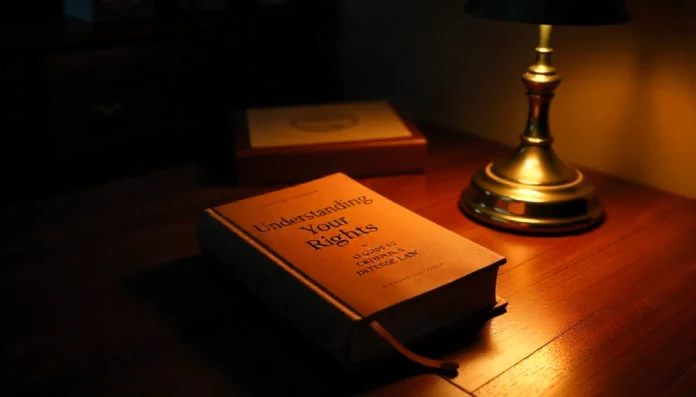Getting arrested changes everything in an instant. Maybe you were driving home from dinner and got pulled over.
Maybe there was a fight at a bar, and suddenly you’re facing assault charges. Maybe someone accused you of something you didn’t do.
The system moves fast once you’re in it. Police officers, prosecutors, judges – they all know the process inside and out.
You don’t. And that puts you at a serious disadvantage right from the start. Knowing what to expect and how to protect yourself can mean the difference between going home and going to jail.
Know What You’re Dealing With
Criminal charges aren’t all created equal. Some people think getting arrested automatically means you’re guilty of something, but that’s not how it works at all.
Misdemeanors are the lighter stuff – think traffic violations, minor drug possession, or petty theft. You might face fines, community service, or maybe some jail time, but we’re talking months, not years.
Felonies are serious business. These include things like:
- Robbery
- Drug trafficking
- Assault with a deadly weapon
- White collar crimes
Felonies can land you in prison for years, sometimes decades. They also stick with you long after you’ve served your time. Getting a job, finding housing, even voting can become complicated with a felony on your record.
Then there are federal crimes. These happen when you cross state lines, use the internet, or violate federal laws. Federal cases are a whole different beast with different rules and usually harsher penalties.
What to Do When Police Show Up
This is where most people panic and make mistakes that haunt them later.
You have rights. Use them. The Fifth Amendment isn’t just something they say on TV shows – it’s real protection.
Stay calm. Easier said than done, but getting aggressive or running just makes everything worse.
Say these magic words: “I want to speak to my lawyer.” That’s it. Don’t explain your situation, don’t try to convince them you’re innocent, don’t answer “just a few quick questions.”
Police can lie to you during questioning. They can tell you they have evidence they don’t have, claim your friend already confessed, or say things will go easier if you just cooperate. None of that has to be true.
What you should do:
- Ask if you’re free to leave
- If not, you’re being detained – ask why
- Request a lawyer immediately
- Don’t consent to searches
- Don’t sign anything without legal representation
What you shouldn’t do:
- Answer questions beyond basic identification
- Let them search your property without a warrant
- Believe promises about leniency
- Think you can talk your way out of it
Getting the Right Legal Help
Not all lawyers are the same. You wouldn’t hire a divorce attorney to handle your tax audit, right?
Criminal defense attorneys spend their careers learning the ins and outs of criminal law. They know the prosecutors, the judges, the local court procedures.
Public defenders get a bad reputation, but many are experienced and dedicated. The problem is they’re usually overwhelmed with cases. If you qualify for a public defender, you’ll get one, but they might not have much time for your case.
Private attorneys cost money, sometimes a lot of money, but they typically have more time to focus on your specific situation. When looking for experienced Maryland Criminal Defense attorneys, you want someone who’s handled cases similar to yours and knows the local court system.
Questions to ask potential lawyers:
- How many cases like mine have you handled?
- What’s your strategy for my case?
- What are the possible outcomes?
- How much will this cost, and what’s included?
How the Court Process Really Works
Movies make it look like everything happens in one dramatic courtroom scene. Reality is way more boring and takes way longer.
Arraignment is your first court appearance. You’ll hear the charges and enter a plea. Usually, this is when you plead not guilty, even if you think you might be guilty later. This preserves your options.
Pre-trial motions are where your lawyer tries to get evidence thrown out or charges dismissed. Maybe the police search was illegal, maybe your rights were violated. This stuff happens before trial and can sometimes end your case entirely.
Discovery is when both sides share evidence. Your lawyer gets to see what the prosecution has against you, and sometimes it’s not as strong as they initially claimed.
Plea negotiations happen in most cases. The prosecutor might offer a deal – plead guilty to a lesser charge to avoid the risk of a harsher sentence at trial. This is a big decision that depends on your specific circumstances.
Trial is the last resort when plea negotiations don’t work out. The prosecution has to prove you’re guilty beyond a reasonable doubt. That’s a high standard, but trials are risky for both sides.
Protecting Yourself From Day One
The best defense starts before you ever need a lawyer.
Document everything you can remember about what happened. Write it down while it’s fresh in your memory. Details matter, and you might forget important stuff later.
Don’t talk to anyone about your case except your lawyer. That includes family, friends, cellmates if you’re in jail, and especially people you don’t know well. Anything you say can potentially be used against you.
Gather contact information for witnesses who might help your case. If someone saw what really happened, you want to be able to find them later.
Stay out of trouble while your case is pending. Getting arrested again while you already have charges complicates everything and makes you look bad to judges and juries.
Your future depends on the decisions you make right now. Don’t try to handle serious criminal charges alone. The system is complicated enough when you have good legal help – without it, you’re just hoping for the best.



